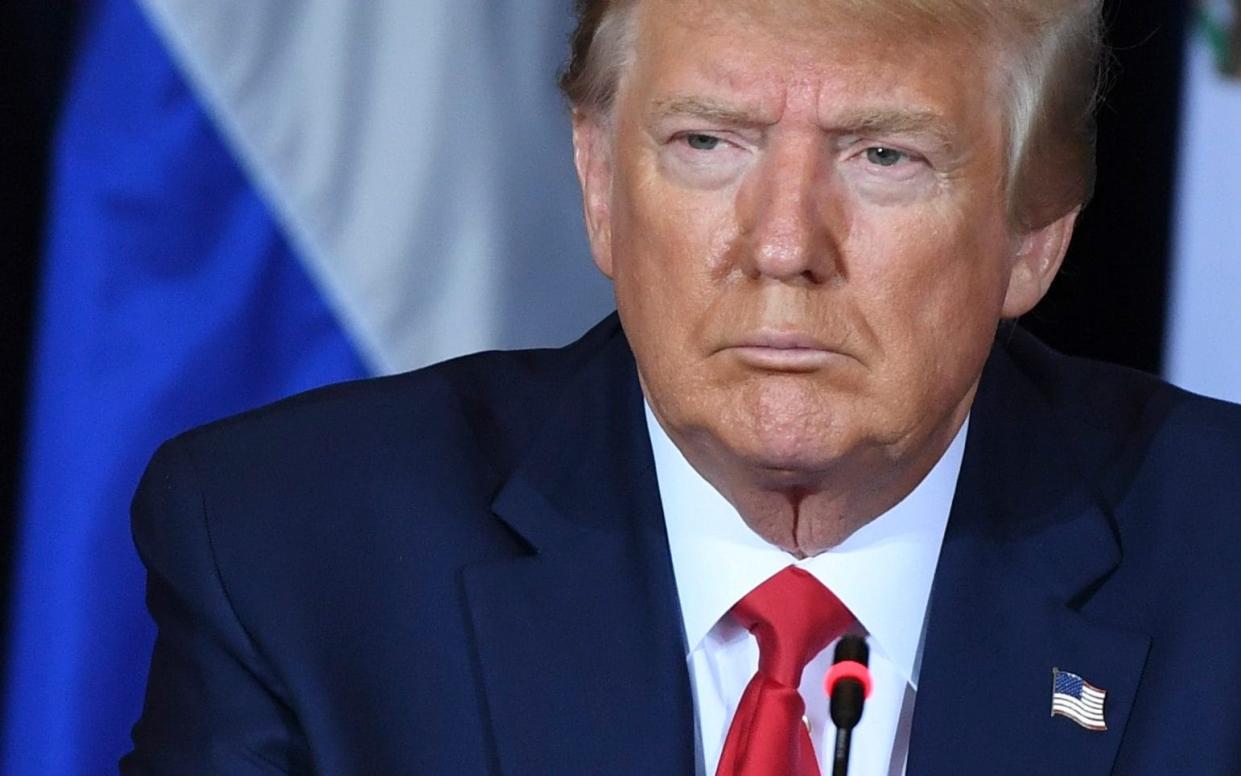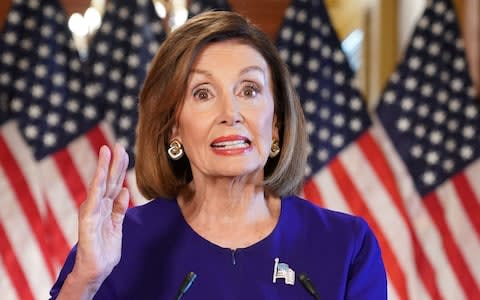Donald Trump-Ukraine whistleblower battles to keep identity secret amid Republican attacks

The whistleblower at the heart of the Trump-Ukraine scandal was facing an uphill battle to keep their identity hidden last night amid fierce attacks from the US president and biographic details emerging in the media.
Intelligence figures, Democrats and the whistleblower’s own lawyers insisted it is right that the person's anonymity is protected after their detailed complaint lodged about Donald Trump's behaviour was made public on Thursday.
But Republicans from the White House down have repeatedly called into question the whistleblower’s motives as they attempted to unpick the allegations that have triggered impeachment proceedings.
Mr Trump asked whether the person was a “partisan operative” on Friday, tweeting: “Sounding more and more like the so-called whistleblower isn’t a whistleblower at all.”
There are signs that the American public support the launch of an impeachment inquiry, with three polls taken after the announcement showing more people approving than disapproving and a fourth showing a tie. Before this week polls consistently showed the country opposed to impeachment.
With the full political impact of the whistleblower’s claims beginning to become clear, details of the unnamed individual at the centre of the scandal have emerged in US media reports.
Sounding more and more like the so-called Whistleblower isn’t a Whistleblower at all. In addition, all second hand information that proved to be so inaccurate that there may not have even been somebody else, a leaker or spy, feeding it to him or her? A partisan operative?
— Donald J. Trump (@realDonaldTrump) September 27, 2019
The New York Times reported that the person was a male CIA officer who was once detailed to work at the White House.
The paper also said the individual had first submitted allegations to the CIA’s top lawyer but, after learning the complaint had been shared with the White House, went through a formal whistleblower process which includes legal protections.
That nine-page complaint was published on Thursday. It alleged that Mr Trump misused his presidential powers by urging Ukraine's leader to investigate his political rival Joe Biden, the former US vice president, and that the White House tried to cover it up.
Mr Trump has denied any wrongdoing. The whistle-blower was not a direct witness for the alleged actions described in the complaint – something Republicans have jumped on.
But already some of their claims have been corroborated. The complaint’s description of the July 25 phone call between Mr Trump and Ukranian president Volodymyr Zelenskiy proved accurate, with a transcript of the call released this week showing the US president did indeed urge an investigation into Mr Biden and his son.

On Friday the White House confirmed that lawyers had directed storing a transcript of the call on a computer system which handles classified material, though argued the records had been dealt with “appropriately”. The whistleblower claimed it was an attempt to limit access to the transcript.
Mr Trump has issued a string of claims and criticisms about the whistleblower, despite admitting he also does not know their identity. A leaked recording of a speech behind closed doors on Wednesday showed Mr Trump made allusions to reprisals after saying he wanted to know who gave information to the whistleblower.
“You know what we used to do in the old days when we were smart with spies and treason, right? We used to handle it a little differently than we do now,” he said.
Nancy Pelosi, the Democratic House Speaker, criticised that comment, saying she prays for Mr Trump to “see right from wrong” and insisting it was important the whistleblower did not face “retaliation”.
Joseph Maguire, the acting director of US national intelligence who handled the complaint, said in a hearing on Thursday: “We must protect those who demonstrate the courage to report alleged wrongdoing, whether on the battlefield or in the workplace.”

Andrew Bakaj, the lead lawyer for the whistleblower, had warned that publishing information about the source of the claims was “deeply concerning and reckless, as it can place the individual in harm’s way.”
Dean Baquet, the executive editor of The New York Times, defended the decision to publish some details, saying it would let readers “make their own judgments” about whether the individual was “credible”.
There are signs that the Democrats are eager to push ahead quickly with their impeachment inquiry, which must happen before any vote on articles of impeachment.
Some Democrats reportedly want to complete the probe by the end of October. A Democratic leadership source told The Telegraph they want the inquiry done “expeditiously” but did not give a date.
Republican allies of Mr Trump have stood behind the president, arguing that so-called ‘Ukrainegate’ has been blown out of proportion by Democrats and a media willing to bring him down.
In an early morning tweet storm on Friday, Mr Trump hit out at coverage of the scandal and one of the Democrats leading the impeachment investigation, calling him a “sick man”.
He tweeted: “If that perfect phone call with the President of Ukraine isn’t considered appropriate, then no future President can EVER again speak to another foreign leader!”

